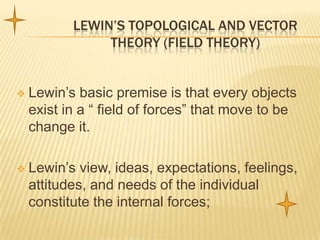
Lewin’s topological and vector theory (field theory report on nov. 30
- 1. LEWIN’S TOPOLOGICAL AND VECTOR THEORY (FIELD THEORY) Lewin’s basic premise is that every objects exist in a “ field of forces” that move to be change it. Lewin’s view, ideas, expectations, feelings, attitudes, and needs of the individual constitute the internal forces;
- 2. LEWIN’S THEORY According to Lewin’s theory, an individual lives in life space which is actually his environment; there external forces which are acting on the individual such as things, situations, or conditions.
- 3. BRUNER’S THEORY OF LEARNING INVOLVES THREE PROCESSES, NAMELY: Acquisition this is the process of obtaining new information that can either replace or refine something previously known.
- 4. BRUNER’S THEORY OF LEARNING INVOLVES THREE PROCESSES, NAMELY: Transformation Is the manipulation of information to fit new situations. Evaluation is checking whether or not the learned material has be manipulated appropriately.
- 5. ACCORDING TO BRUNER’S THERE ARE 4 CONCERNS WHICH ARE THE BASIC TO ANY LEARNING SITUATION. Understanding Understanding relationships and relating knowledge structures to one another which will enable the learner to remember the material.
- 6. READINESS Bruner believes that there is no need to defer instruction in certain subjects until a child has reached the appropriate maturational level for it. According to Bruner, subject matter can be matched with the cognitive level of the child.
- 7. DEVELOPMENT OF THE INDEPENDENT LEARNER According to Bruner, must have as its object to help the learner to be a self – sufficient problem- solver.
- 8. MOTIVATION S Bruner’s believes that intrinsic motivation means creating a desire to learn a subject because it is worth knowing, while extrinsic motivation comes in the form of reward and punishment. Bruner’s research contributes to the understanding of learning situation.
- 9. Thank you For Listening Report by: Marites M. Samonte
